|
|
 |
  
Alain Delon
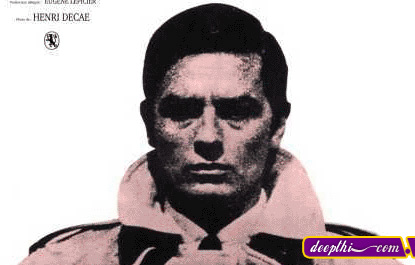

Alain Delon: Biography
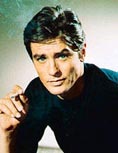
The magnetic Alain Delon was among the most prominent French actors of the postwar era; an exotically handsome performer, he sprung from offscreen rumor and scandal to emerge as a uniquely enigmatic and sinister talent. Born November 8, 1935, in Sceaux, France, Delon spent his formative years primarily in the care of foster parents. He later was sent away to a series of boarding schools, and at the age of 17, he joined the marines, serving as a parachutist in Indo-China. Upon his discharge, Delon returned to Marseilles and struck up a friendship with aspiring actor Jean-Claude Brialy, who invited him to attend the 1957 Cannes Film Festival. There Delon's delicate good looks won him a number of movie offers, including a rumored seven-year deal with David O. Selznick. In the end, he accepted a small role in the Edwige Feuillere film Quand la Femme S'en Mele, followed by an appearance in 1957's Sois Belle Et Tais-Toi.
Alain Delon: Career
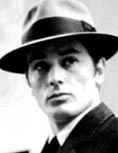
Delon's first lead role in a picture came opposite Romy Schneider, to whom he was later briefly engaged, in 1958's Christine. A handful of other supporting turns followed before he won the lead in Rene Clement's stylish 1960 thriller Plein Soleil, an international hit which cast him as a murderous American traveling abroad. In 1960, he appeared in Luchino Visconti's Rocco e i Suoi Fratelli. Under Visconti, he also reunited with Schneider on-stage in a production of 'Tis Pity She's a Whore. Next teaming again with Clement, Delon appeared in 1961's Che Gioia Vivere, followed by an appearance with Brigitte Bardot in Les Amours Celebres.
Despite mixed critical regard for his work, Delon was a favorite among many of the era's most prominent filmmakers, and in 1962 he starred in Michelangelo Antonioni's brilliant L'Eclisse followed by a turn in Visconti's 1963 masterpiece Il Gattopardo. These many high-profile projects boosted Delon to international prominence, and his next project, 1963's Melodie En Sous-Sol, was a big-budget gangster tale co-starring Jean Gabin. With 1964's Les Felins, he turned to producing as well as performing, later establishing his own company, Adel Productions. With 1965's Once a Thief, Delon made his Hollywood debut, followed by The Lost Command, Texas Across the River, and Yellow Rolls-Royce. By 1967, however, he was back in France, appearing alongside wife Nathalie Delon in Jean-Pierre Melville's cult classic Le Samourai -- a role which defined the self-absorbed loner persona he continued to develop over subsequent performances -- and with Marianne Faithfull in The Girl on a Motorcycle a year later.
In 1969, Delon and his wife found themselves at the center of a massive scandal when their bodyguard was found shot to death, his body left in a garbage dump. The subsequent investigation into his killing threatened to implicate many of France's most prominent celebrities and politicians in a sordid web of murder, drugs, and sex. Many predicted the demise of Delon's career, but he spun the tabloid headlines to his favor. In the eyes of many filmgoers, his myriad portrayals of gangsters, killers, and sexual deviants suddenly took on new reality in light of the similar exploits he experienced in his offscreen life, and a notorious television interview in which he admitted to past homosexual liaisons -- as well as many other seamy adventures -- tantalized audiences even more. In the wake of the controversy, Delon starred in four consecutive gangster films -- Jean Herman's Jeff, Henri Verneuil's Le Clan des Siciliens, Jacques Deray's Borsalino (with Jean-Paul Belmondo), and Melville's Le Cercle Rouge -- all of them hugely successful with European audiences; Hollywood fame continued to elude him, however, and English-language efforts like 1973's Scorpio failed to attract audiences.
Nevertheless, Delon spent much of the 1970s as France's biggest star. Monsieur Klein (1976), directed by Joseph Losey, won a Cesar as the year's best picture, and thrillers like 1977's Comme Un Boomerang and Le Gang continued to perform extremely well at the box office. In 1979, he again tried to penetrate the American market in the star-studded Airport '79: Concord, but, as before, he returned home without success. In 1981, Delon turned to directing with Pour la Peau d'un Flic, which he followed two years later with Le Battant. In 1984, he co-starred in Volker Schlöndorff's Un Amour de Swann, the most prestigious project he had graced in well over a decade. That same year he garnered a Cesar for his work in Notre Histoire, and in 1985 Parole de Flic became another major hit. Following miserable reviews and receipts for 1986's Le Passage, however, Delon's prolific shooting schedule began to taper off, and he selected projects with greater discretion. Among those chosen was 1990's Nouvelle Vague, which paired him for the first time with director Jean-Luc Godard. During the 1990s, his profile continued to recede from the screen as he focused on various business ventures, and he did not reappear before the camera prior to 1994's L' Ours en Peluche. After a cameo in Agnes Varda's all-star 1995 production Les Cent et une Nuits de Simon Cinema, he next resurfaced in 1997's Le Jour et la Nuit
Alain Delon: Films
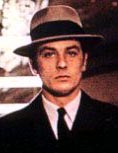
The Red Circle (2003), Day and Night (1997), Purple Noon (1996), Un Amour de Swann (1984), Honor Among Thieves (1982), The Concorde: Airport '79 (1979), The Hurried Man (1977), Mr. Klein (1976), Flic Story (1975), Borsalino and Co. (1974), Zorro (1974), Creezy (1973), Scorpio (1973), Two Men in Town (1973), The Assassination of Trotsky (1972), Dirty Money (1971), Red Sun (1971), Le Cercle Rouge (1970), The Swimming Pool (1970), Spirits of the Dead (1969), Girl on a Motorcycle (1968), Diabolically Yours (1967), The Last Adventure (1967), Le Samourai (1967), Is Paris Burning? (1966), The Lost Command (1966), Texas Across the River (1966), Joy House (1964), Melodie En Sous-Sol (1963), Any Number Can Win (1963), The Leopard (Il Gattopardo) (1963), The Leopard (1963), The Eclipse (1962), The Eclipse (L'Eclisse) (1962),Rocco and His Brothers (1961), Purple Noon (1960), Boomerang (1946)
Alain Delon's Photo Gallery
Alain Delon
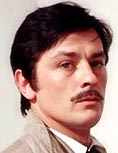 Alain Delon
|
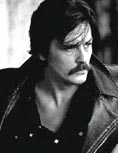 Alain Delon
|
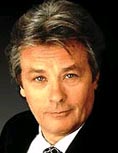 Alain Delon
|
|
 |






 The magnetic Alain Delon was among the most prominent French actors of the postwar era; an exotically handsome performer, he sprung from offscreen rumor and scandal to emerge as a uniquely enigmatic and sinister talent. Born November 8, 1935, in Sceaux, France, Delon spent his formative years primarily in the care of foster parents. He later was sent away to a series of boarding schools, and at the age of 17, he joined the marines, serving as a parachutist in Indo-China. Upon his discharge, Delon returned to Marseilles and struck up a friendship with aspiring actor Jean-Claude Brialy, who invited him to attend the 1957 Cannes Film Festival. There Delon's delicate good looks won him a number of movie offers, including a rumored seven-year deal with David O. Selznick. In the end, he accepted a small role in the Edwige Feuillere film Quand la Femme S'en Mele, followed by an appearance in 1957's Sois Belle Et Tais-Toi.
The magnetic Alain Delon was among the most prominent French actors of the postwar era; an exotically handsome performer, he sprung from offscreen rumor and scandal to emerge as a uniquely enigmatic and sinister talent. Born November 8, 1935, in Sceaux, France, Delon spent his formative years primarily in the care of foster parents. He later was sent away to a series of boarding schools, and at the age of 17, he joined the marines, serving as a parachutist in Indo-China. Upon his discharge, Delon returned to Marseilles and struck up a friendship with aspiring actor Jean-Claude Brialy, who invited him to attend the 1957 Cannes Film Festival. There Delon's delicate good looks won him a number of movie offers, including a rumored seven-year deal with David O. Selznick. In the end, he accepted a small role in the Edwige Feuillere film Quand la Femme S'en Mele, followed by an appearance in 1957's Sois Belle Et Tais-Toi.
 Delon's first lead role in a picture came opposite Romy Schneider, to whom he was later briefly engaged, in 1958's Christine. A handful of other supporting turns followed before he won the lead in Rene Clement's stylish 1960 thriller Plein Soleil, an international hit which cast him as a murderous American traveling abroad. In 1960, he appeared in Luchino Visconti's Rocco e i Suoi Fratelli. Under Visconti, he also reunited with Schneider on-stage in a production of 'Tis Pity She's a Whore. Next teaming again with Clement, Delon appeared in 1961's Che Gioia Vivere, followed by an appearance with Brigitte Bardot in Les Amours Celebres.
Despite mixed critical regard for his work, Delon was a favorite among many of the era's most prominent filmmakers, and in 1962 he starred in Michelangelo Antonioni's brilliant L'Eclisse followed by a turn in Visconti's 1963 masterpiece Il Gattopardo. These many high-profile projects boosted Delon to international prominence, and his next project, 1963's Melodie En Sous-Sol, was a big-budget gangster tale co-starring Jean Gabin. With 1964's Les Felins, he turned to producing as well as performing, later establishing his own company, Adel Productions. With 1965's Once a Thief, Delon made his Hollywood debut, followed by The Lost Command, Texas Across the River, and Yellow Rolls-Royce. By 1967, however, he was back in France, appearing alongside wife Nathalie Delon in Jean-Pierre Melville's cult classic Le Samourai -- a role which defined the self-absorbed loner persona he continued to develop over subsequent performances -- and with Marianne Faithfull in The Girl on a Motorcycle a year later.
In 1969, Delon and his wife found themselves at the center of a massive scandal when their bodyguard was found shot to death, his body left in a garbage dump. The subsequent investigation into his killing threatened to implicate many of France's most prominent celebrities and politicians in a sordid web of murder, drugs, and sex. Many predicted the demise of Delon's career, but he spun the tabloid headlines to his favor. In the eyes of many filmgoers, his myriad portrayals of gangsters, killers, and sexual deviants suddenly took on new reality in light of the similar exploits he experienced in his offscreen life, and a notorious television interview in which he admitted to past homosexual liaisons -- as well as many other seamy adventures -- tantalized audiences even more. In the wake of the controversy, Delon starred in four consecutive gangster films -- Jean Herman's Jeff, Henri Verneuil's Le Clan des Siciliens, Jacques Deray's Borsalino (with Jean-Paul Belmondo), and Melville's Le Cercle Rouge -- all of them hugely successful with European audiences; Hollywood fame continued to elude him, however, and English-language efforts like 1973's Scorpio failed to attract audiences.
Nevertheless, Delon spent much of the 1970s as France's biggest star. Monsieur Klein (1976), directed by Joseph Losey, won a Cesar as the year's best picture, and thrillers like 1977's Comme Un Boomerang and Le Gang continued to perform extremely well at the box office. In 1979, he again tried to penetrate the American market in the star-studded Airport '79: Concord, but, as before, he returned home without success. In 1981, Delon turned to directing with Pour la Peau d'un Flic, which he followed two years later with Le Battant. In 1984, he co-starred in Volker Schlöndorff's Un Amour de Swann, the most prestigious project he had graced in well over a decade. That same year he garnered a Cesar for his work in Notre Histoire, and in 1985 Parole de Flic became another major hit. Following miserable reviews and receipts for 1986's Le Passage, however, Delon's prolific shooting schedule began to taper off, and he selected projects with greater discretion. Among those chosen was 1990's Nouvelle Vague, which paired him for the first time with director Jean-Luc Godard. During the 1990s, his profile continued to recede from the screen as he focused on various business ventures, and he did not reappear before the camera prior to 1994's L' Ours en Peluche. After a cameo in Agnes Varda's all-star 1995 production Les Cent et une Nuits de Simon Cinema, he next resurfaced in 1997's Le Jour et la Nuit
Delon's first lead role in a picture came opposite Romy Schneider, to whom he was later briefly engaged, in 1958's Christine. A handful of other supporting turns followed before he won the lead in Rene Clement's stylish 1960 thriller Plein Soleil, an international hit which cast him as a murderous American traveling abroad. In 1960, he appeared in Luchino Visconti's Rocco e i Suoi Fratelli. Under Visconti, he also reunited with Schneider on-stage in a production of 'Tis Pity She's a Whore. Next teaming again with Clement, Delon appeared in 1961's Che Gioia Vivere, followed by an appearance with Brigitte Bardot in Les Amours Celebres.
Despite mixed critical regard for his work, Delon was a favorite among many of the era's most prominent filmmakers, and in 1962 he starred in Michelangelo Antonioni's brilliant L'Eclisse followed by a turn in Visconti's 1963 masterpiece Il Gattopardo. These many high-profile projects boosted Delon to international prominence, and his next project, 1963's Melodie En Sous-Sol, was a big-budget gangster tale co-starring Jean Gabin. With 1964's Les Felins, he turned to producing as well as performing, later establishing his own company, Adel Productions. With 1965's Once a Thief, Delon made his Hollywood debut, followed by The Lost Command, Texas Across the River, and Yellow Rolls-Royce. By 1967, however, he was back in France, appearing alongside wife Nathalie Delon in Jean-Pierre Melville's cult classic Le Samourai -- a role which defined the self-absorbed loner persona he continued to develop over subsequent performances -- and with Marianne Faithfull in The Girl on a Motorcycle a year later.
In 1969, Delon and his wife found themselves at the center of a massive scandal when their bodyguard was found shot to death, his body left in a garbage dump. The subsequent investigation into his killing threatened to implicate many of France's most prominent celebrities and politicians in a sordid web of murder, drugs, and sex. Many predicted the demise of Delon's career, but he spun the tabloid headlines to his favor. In the eyes of many filmgoers, his myriad portrayals of gangsters, killers, and sexual deviants suddenly took on new reality in light of the similar exploits he experienced in his offscreen life, and a notorious television interview in which he admitted to past homosexual liaisons -- as well as many other seamy adventures -- tantalized audiences even more. In the wake of the controversy, Delon starred in four consecutive gangster films -- Jean Herman's Jeff, Henri Verneuil's Le Clan des Siciliens, Jacques Deray's Borsalino (with Jean-Paul Belmondo), and Melville's Le Cercle Rouge -- all of them hugely successful with European audiences; Hollywood fame continued to elude him, however, and English-language efforts like 1973's Scorpio failed to attract audiences.
Nevertheless, Delon spent much of the 1970s as France's biggest star. Monsieur Klein (1976), directed by Joseph Losey, won a Cesar as the year's best picture, and thrillers like 1977's Comme Un Boomerang and Le Gang continued to perform extremely well at the box office. In 1979, he again tried to penetrate the American market in the star-studded Airport '79: Concord, but, as before, he returned home without success. In 1981, Delon turned to directing with Pour la Peau d'un Flic, which he followed two years later with Le Battant. In 1984, he co-starred in Volker Schlöndorff's Un Amour de Swann, the most prestigious project he had graced in well over a decade. That same year he garnered a Cesar for his work in Notre Histoire, and in 1985 Parole de Flic became another major hit. Following miserable reviews and receipts for 1986's Le Passage, however, Delon's prolific shooting schedule began to taper off, and he selected projects with greater discretion. Among those chosen was 1990's Nouvelle Vague, which paired him for the first time with director Jean-Luc Godard. During the 1990s, his profile continued to recede from the screen as he focused on various business ventures, and he did not reappear before the camera prior to 1994's L' Ours en Peluche. After a cameo in Agnes Varda's all-star 1995 production Les Cent et une Nuits de Simon Cinema, he next resurfaced in 1997's Le Jour et la Nuit
 The Red Circle (2003), Day and Night (1997), Purple Noon (1996), Un Amour de Swann (1984), Honor Among Thieves (1982), The Concorde: Airport '79 (1979), The Hurried Man (1977), Mr. Klein (1976), Flic Story (1975), Borsalino and Co. (1974), Zorro (1974), Creezy (1973), Scorpio (1973), Two Men in Town (1973), The Assassination of Trotsky (1972), Dirty Money (1971), Red Sun (1971), Le Cercle Rouge (1970), The Swimming Pool (1970), Spirits of the Dead (1969), Girl on a Motorcycle (1968), Diabolically Yours (1967), The Last Adventure (1967), Le Samourai (1967), Is Paris Burning? (1966), The Lost Command (1966), Texas Across the River (1966), Joy House (1964), Melodie En Sous-Sol (1963), Any Number Can Win (1963), The Leopard (Il Gattopardo) (1963), The Leopard (1963), The Eclipse (1962), The Eclipse (L'Eclisse) (1962),Rocco and His Brothers (1961), Purple Noon (1960), Boomerang (1946)
The Red Circle (2003), Day and Night (1997), Purple Noon (1996), Un Amour de Swann (1984), Honor Among Thieves (1982), The Concorde: Airport '79 (1979), The Hurried Man (1977), Mr. Klein (1976), Flic Story (1975), Borsalino and Co. (1974), Zorro (1974), Creezy (1973), Scorpio (1973), Two Men in Town (1973), The Assassination of Trotsky (1972), Dirty Money (1971), Red Sun (1971), Le Cercle Rouge (1970), The Swimming Pool (1970), Spirits of the Dead (1969), Girl on a Motorcycle (1968), Diabolically Yours (1967), The Last Adventure (1967), Le Samourai (1967), Is Paris Burning? (1966), The Lost Command (1966), Texas Across the River (1966), Joy House (1964), Melodie En Sous-Sol (1963), Any Number Can Win (1963), The Leopard (Il Gattopardo) (1963), The Leopard (1963), The Eclipse (1962), The Eclipse (L'Eclisse) (1962),Rocco and His Brothers (1961), Purple Noon (1960), Boomerang (1946)


